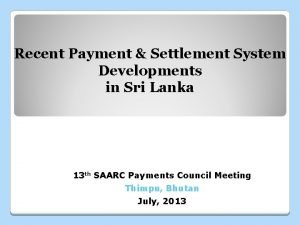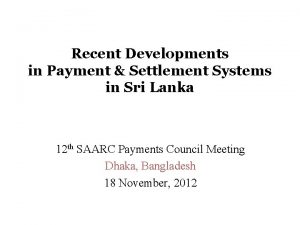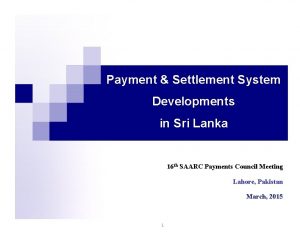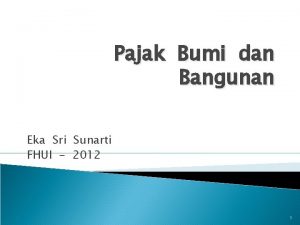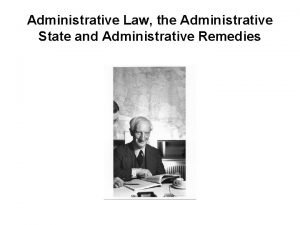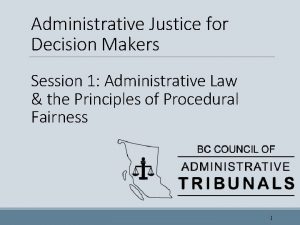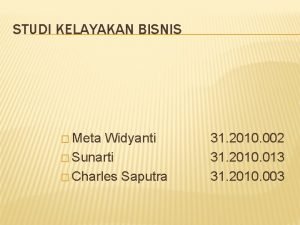Administrative Authority Action and Decision Eka Sri Sunarti

























- Slides: 25

Administrative Authority, Action and Decision Eka Sri Sunarti Administrative Law Bachelor Program International Class Spring Semester 2012 Faculty of Law-UI

Administrative Authority An official, in occupying administrative office, should be vested with legitimate authority according to prevailing laws, by ways of… 1. Attribution 2. Delegation 3. Mandate An authority is always bound to… �Period or time-frame �Scope or subject matters �Place or territory Faculty of Law-UI

Types of Authority Attribution is granting of a new authority to an administrative official by law in order to conduct administration in full capacity 2. Delegation is partial transfer of authority originating from attributive authority to an administrative official 3. Mandate is an assignment given to a mandatory/mandatarius (acceptor of mandate) by a mandator/mandans (giver of mandate) to accomplish certain tasks or duties, while the authority stays in the hand of mandans 1. Faculty of Law-UI

Authority Based on Laws �Regulation or laws are the sources of administrative authorities. They serve as bases of legality for any action and or decision taken by administrative officials. �Regulation here concerns with legislations adopted by competent legislators, which include (a) original legislators in central and local levels; and, (b) delegated legislators i. e. President and administrative apparatus under his command. Faculty of Law-UI

Stufenbau der Nawiasky Staatsfundamentalnorm Staatsgrundgesetz Formelle Gesetz Verordnungen/ Autonome Satszungen Faculty of Law-UI

Hierarchy in Indonesia �State's Fundamental Norm: Pancasila, Preamble of 1945 Constitution �State's Basic Law: Articles of 1945 Constitution, Decrees of People's Consultative Assembly, Conventions �Formal Law: Law �Implementing Regulations/ Autonomous Administrative Regulations: Government Regulations, Presidential Regulations, Local Regulations, Decrees of regulatory bodies, head of autonomous regions, ministers Faculty of Law-UI

To Avoid Abuse of Power �Public authority grants its holder two kinds of extraordinary powers i. e. 1. Prealable Authority. The authority to take actions and decisions without consulting any third party or asking for his/her consent; and, 2. Ex officio Authority. The authority to take actions and decisions due to one's office, uncontestable by others �These authority shall be exercised according to prevailing laws and regulations, or else there will be abuse of power. Faculty of Law-UI

Limits to Authority Administrative actions and decisions should be taken. . . � Efficiency (doelmatigheid) - in accordance with predetermined goals. � Legality (rechtmatigheid) - lawfully i. e. just, proper and fair � Regularity (wetmatigheid) - based upon written laws � Discretionary Power (freies ermessen, pouvoir discretionnaire) - based upon own (wise) judgment and consideration � according to… Proper/Good Governance (GG), General Principles of (algemene beginselen van behoorlijk bestuur) Faculty of Law-UI

Algemene Beginselen van Behoorlijk Bestuur �provides basis and ethical nuance in legal system —Paul Scholten �serves as basic norms and standards for administrative officials in adopting public policy — Bellefroid �gives direction while taking actions and decisions in the exercise of administrative power —Konijnenbelt Faculty of Law-UI

Algemene Wet Bestuursrecht �In Netherlands, study on the principles of good governance was pioneered by de Monchy in 1950, due to the facts that many public interests were neglected back then. �Previously, it was in the form of unwritten principles and not included in any Laws, but nowadays codified in Algemene Wet Bestuurrecht; Awb 1994 (General Administrative Law Act; GALA) Faculty of Law-UI

De Monchy’s GG �Legal certainty �Balance �Equality �Carefulness �Fairness �Justice �Protection to Outlook on Life �Consideration �Exercise of Public Interest �Honesty �Impartiality �Respect to others' opinion �accountability Faculty of Law-UI

Functions of GG �Guidance for administrative officials in taking decisions, actions and in lawmaking. �Basis for claims against administrative decisions should the principles be violated �A yardstick to measure the lawfulness of administrative decisions in question. �A tool to prevent abuse of power or authority, injustice and dishonesty. Faculty of Law-UI

Prayudi's Categories of GG �Principles on Decision Making Procedures i. e. (i) Decision makers shall never have personal interest in deciding matters; (ii) public opinion shall be solicited prior to making decisions that harm public interest; (iii) factual condition shall be taken into consideration. �Principles on the Accuracy of Facts that Serve as Basis for Decision Making i. e. (i) prohibition to arbitrariness; (ii) prohibition to abuse and transgression of authority; (iii) legal certainty; (iv) prohibition to legal discrimination; (v) null due to carelessness of administrative official. Faculty of Law-UI

GG in Indonesia In Indonesia, Principles of Good Governance can be found, among others, in. . . �Law 5/1986 on Administrative Court. General Elucidation. �Law 29/1999 on Clean Government, Free from Corruption, Collusion and Nepotism. �Law 37/2008 on Ombudsman. �Law 25/2009 on Public Service. �Draft Laws on Government Administration and Ethics of State Administrator Faculty of Law-UI

Types of Administrative Action �Material, non-legal action (bestuursdaad) - actions taken in implementing administrative functions whose consequences are not regulated by laws; �Legal action (rechtshandeling) actions take in implementing legal functions of administration, whose consequences are regulated and sanctioned by law i. e. nonperformance is subject to legal sanctions. Faculty of Law-UI

Administrative Legal Action Private Public One-sided Decision Double-sided Regulation Faculty of Law-UI

Double-sided Public Legal Action �is basically agreements governed by public law. �resulted from contracts where government is one of the parties. �General contractual matters are governed by private law, but details are governed by public law. �Examples include short-term procurement involving government bodies/officials and private contractors (public-private partnership? ) Faculty of Law-UI

One-sided Public Legal Action �is basically unilateral actions taken and implemented by government bodies/officials based on extraordinary authority. �hence, there are 4 (four) elements i. e. i. unilateral; ii. pertaining to administrative matters; iii. taken and implemented by government bodies/officials; and, iv. based on extraordinary authority. Faculty of Law-UI

Regulation (Regeringsbesluit) �Public. Applies to general public i. e. everyone �Abstract. subject matters are of a general nature. �Continual. in effect continually (dauerhaftig). �Examples: all implementing regulations/ autonomous administrative regulations Faculty of Law-UI

Decision (Beschikking) �Individual. applies to certain individuals/ persons only i. e. identities are clearly stated. �Concrete. pertaining to specific subject matters. �One-off. applies and finished at the time it is decided (einmalig). �Examples • Legislative realm: Law on Budget, Ratification • Judicial realm: Judge's decisions/ verdicts • Administrative realm: decrees Faculty of Law-UI

Classification of Administrative Actions �Nature (i) order-giving; and, (ii) service- giving. �Consequences (i) legal consequence; and, (ii) non-legal consequence. �Applicability (i) individual; and, (ii) public. �Opposability (i) internal; and, (ii) external. �Manifestation of intention (i) unilateral; (ii) bilateral; and, (iii) multilateral. �Structure (i) simple; and, (ii) complex. Faculty of Law-UI

Validity Requirements �Decisions adopted and/or passed by authorized body/official i. e. in subject matters, location/territory and timeframe. �Decisions shall not have legal defects, errors, coercion, and/or fraud. �Decision's form and content, as well as goals, shall be in accordance with its legal bases. Faculty of Law-UI

Annulment of Decisions �Ex Tunc. Annulment of decision by court due to essential defects. The decision is deemed null and void since its adoption. �Ex Nunc. Annulment of decision by court due to defects. The decision was valid until the day it was annulled by the court. Faculty of Law-UI

Prayudi’s Categories of Decision � Negative Decision. Rejection of applications from the public due to failure in fulfilling requirements, hence, can be resubmitted. � Positive Decision. Granting of applications both wholly or partially, that consists of: � Decision that creates new legal situation in general � Decision that creates new legal situation for certain object. � Decision that incorporate or dissolve legal entity � Favorable decisions, that include dispensation, permit, license and concession. Faculty of Law-UI

Favorable Decisions �Dispensation. exempting the applicability of certain requirements. �Permit. exempting the applicability of certain prohibitions. �License. decision to allow the establishment of companies. �Concession. license with wider applicability. Faculty of Law-UI
 Sri rama sri rama sri manoharama
Sri rama sri rama sri manoharama Administrative structure of health service in sri lanka
Administrative structure of health service in sri lanka No decision snap decision responsible decision
No decision snap decision responsible decision Financial decision
Financial decision Unusual situations that have not been often addressed.
Unusual situations that have not been often addressed. 6 step decision making process
6 step decision making process Line authority adalah
Line authority adalah Dr eka agustia rini
Dr eka agustia rini I.eka
I.eka Dr eka budi wahyana
Dr eka budi wahyana Eka tarwaca susila putra
Eka tarwaca susila putra Bobby eka gunara
Bobby eka gunara Dr eka agustia rini
Dr eka agustia rini Kanya eka santi
Kanya eka santi Hipoglikemia pada neonatus
Hipoglikemia pada neonatus Guerilla usability testing
Guerilla usability testing Decision tree and decision table
Decision tree and decision table Food and beverage industry in sri lanka
Food and beverage industry in sri lanka Pqli advantages and disadvantages
Pqli advantages and disadvantages Payment and settlement system in sri lanka
Payment and settlement system in sri lanka Lanka settle system
Lanka settle system Payment and settlement system in sri lanka
Payment and settlement system in sri lanka Sri lanka accounting standards
Sri lanka accounting standards Chera
Chera Chronological sequential in medias res flashback
Chronological sequential in medias res flashback The lion and the fox exposition
The lion and the fox exposition



















